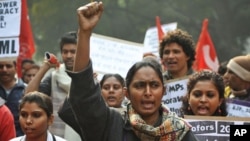In India, the fate of an anti-corruption bill is in limbo after the upper house of parliament failed to pass the measure. The opposition is accusing the government of scuttling the legislation, which was the culmination of months of political debate and public protest in the country.
A day after the upper house of parliament adjourned without holding a widely-awaited vote on the anti-corruption bill, the government faced intense criticism.
The measure, which has been passed by the lower house, seeks to create an independent ombudsman to probe corruption among politicians and bureaucrats.
But after 13 hours of acrimonious debate Thursday, the government abruptly announced at midnight that time had run out and the parliamentary session could not be extended.
Opposition parties say the government deliberately avoided a vote because it faced the likelihood of a defeat as its own allies had refused to support the so-called "Lokpal" bill.
“This was a choreographed action since yesterday…..this government, it has conspired in a manner so as to avoid a vote," said Arun Jaitley, head of the main opposition Bharatiya Janata Party. "It has no right to govern this country even for a day. This government has lost its political authority, it has lost its moral authority.”
Key allies from regional parties had also opposed sections of the bill allowing the central government to create an anti-corruption ombudsman in the states. The opposition BJP has called the measure weak and ineffective because the ombudsman does not have independent powers of investigation.
The government is defending putting off the vote, saying that it needs time to study the nearly 200 amendments brought by members of the upper house or Rajya Sabha. Parliamentary Affairs Minister Pawan Kumar Bansal says the proposed legislation will not be forgotten.
“The bill will remain pending on the register of Rajya Sabha, and the next time we can consider and pass the Bill,” said Bansal.
Political commentator and constitutional expert Subhash Kashyap supports the view that the government shied away from a vote to avoid embarrassment. He says the fate of the anti-corruption bill is uncertain, and it could face more delays.
“It has been put on the political backburner. It was a question of political will on the part of the government and part of political parties," said Kashyap. "If they wanted to pass Lokpal Bill, they could have passed it.”
Meanwhile, anti corruption activist, Anna Hazare, whose year-long mass campaign galvanized the government into drafting the bill, will meet with his supporters next week to decide how to carry forward his movement. They want the bill redrafted to make it stronger.
Hazare cut short his latest hunger strike held this week to pressure parliament due to poor health. But his protest had also drawn far fewer crowds than his previous campaigns, leading commentators to say that his movement has run out of steam.
Political commentator Kashyap says the failure to pass the anti-graft Bill could reinvigorate the movement.
“The stand taken by the government that might give a fresh fillip (stimulus) to the movement, it may awaken the cause, it may instill new life,” he said.
The failure to pass the anti-graft legislation is another blow to the ruling Congress Party. The government also faced an embarrassment earlier this month when it had to withdraw its decision to allow foreign retailers into India due to widespread political opposition.
Anti-Corruption Measure Stalls in India




